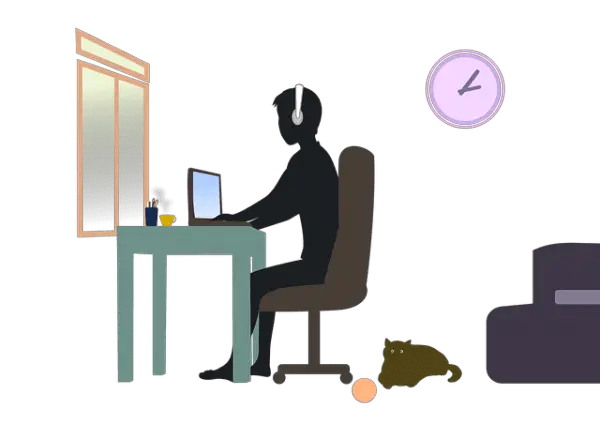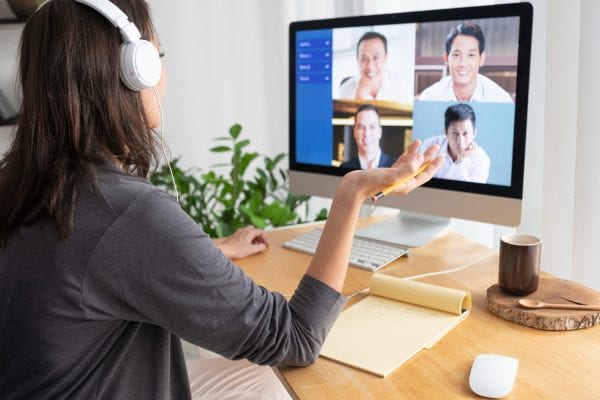A remote closer is a sales professional who works remotely, typically from a home office. Also called inbound closing, remote closing involves individual professionals engaging in sales for online businesses for a percentage commission.
Table of Contents
Who Is a Remote Closer?
A remote closer operates in the room of entrepreneurs to take sales calls as business owners would be too busy to run their businesses and take sales calls at the same time. Remote closers negotiate terms and pricing with prospects. They also provide product demonstrations where necessary and answer questions arising from their presentations.
This career path was born due to the insufficiency of the traditional sales funnel to convert prospects without a sales rep. Leads often had questions they wanted answers to and concerns that needed to be addressed before taking action, and closers close this bridge through persuasion and call to action, usually through a phone or video call.
Because they are often the final touchpoint between a prospect and their decision to buy, remote closers are responsible for securing sales and closing deals during their communication with clients and following up with leads through remote channels like emails and video calls. Even when a closer is working independently, they often need to collaborate with colleagues in the sales pipeline to finalize contracts and seal deals.
A remote closer is a professional in sales, so they understand the principles and techniques deployed to make it happen. They are also expert communicators with strong negotiation techniques. Closers work in these industries:
- Healthcare sales
- Real estate
- Software
- Advertising
- B2B sales
- Financial services
- Education sales
- Industrial sales
- FMCG sales
What Is the Specific Job of A Remote Closer?
A remote closer builds on an existing relationship with a client to get them to take needed action. A closer job comes after another salesperson, usually the remote appointment setter has established a relationship with the prospect. A remote closer works remotely and does not need one-on-one interaction with the client. As a closer, you can work from home or another location convenient for you once there is a reliable internet connection and you have a smartphone or PC with video conferencing abilities.
another location outside of the office with internet connectivity.
How to Become a Remote Appointment Setter: Everything You Need to Know
The remote closer is to identify the issues preventing a prospect from committing to sales, share the benefits of the product and service based on each client’s persona, and influence the customer to take concrete action through proven persuasion techniques. The remote closer is also to negotiate terms and agreements with the prospect and guide them to accept the offer.
As a remote closer, you are to sell customers on an offer after obtaining their contact information from the business owner.
Most remote closers get paid a percentage commission from each deal they close. While the specific roles and responsibilities of closers vary depending on their sales niche, some generic remote closer duties include:
Collaborate: The success of a remote closer’s efforts heavily relies on the proficiency of other workers and salespeople within the sales pipeline. As such, they must be able to collaborate effectively with their colleagues in the sales team. The ability to collaborate well eases the closer’s job and contribution to the organization’s sales goals. To collaborate effectively, remote closers need to contribute to a positive team culture.
Nurture relationships: Remote closers maintain strong relationships with customers and prospects through regular communication and follow-up. They listen to the clients to identify their reservations and step up to address them. They deploy interpersonal skills and emotional intelligence to establish relationships with clients and prospects.
Present sales pitch: Remote closers usually make persuasive presentations to highlight the benefits of their products and services. They deliberately design each presentation to suit the uniqueness of the prospects using various multimedia tools compatible with the chosen digital communication channel.
Negotiate deals: Remote closers are strong negotiators who help clients to overcome inertia and make purchases. They collaborate with the customers to finalize deals, contracts, and agreements. With their excellent communication skills, they show that they understand the prospect’s needs, address their objections and highlight the values of their offerings.
Close sales: Closing sales is the hallmark of a remote closer’s role. Until they do this, their work is not done. They use various techniques to get their clients to commit to purchase. Remote closers need to be confident, decisive, and persistent to influence the client’s decision-making process and close sales.
Maintain sales records: remote closers focus on sales and therefore maintain the records related to all sales activities for their organizations. They maintain records of sales presentations, contract terms, deal negotiation, and actual sales. They are also proficient in using sales tracking tools. Remote closers pay attention to details and organize the records properly for easy documentation and retrieval.
Offer customer support: Remote closers often operate beyond the singular act of making sales to provide support for customers. They assist the clients throughout the sales process and even provide aftersales assistance to keep the communication line open so the client can remain accessible. Through an intimate knowledge of the product and how it meets the customers’ specific needs, they make themselves indispensable to the customers. Closers need problem-solving skills and the ability to organize efficiently to serve their customers excellently.
Decide on Your Niche: Different niche markets have various requirements for their remote closer roles, so you may want to settle on a niche to know what qualifications you need to pursue to land desired jobs. For instance, working as a closer in the healthcare industry may require a degree of medical knowledge while such a requirement will not feature for closers targeting the education field. You need to research various niches and consider your interests, strengths, and experience to choose an area to focus on. You can also prepare for specific niches by searching for the niches with the most promising job outlook and earning potentials for remote closers.
Generate leads: Remote closers put their ears on the ground to identify potential leads through different routes like social listening, networking, market research, and referrals. They deploy analytical, listening, communication, and creative skills to come up with convertible leads. They also work persistently with the leads to help them overcome the obstacles to commit to sales.
How to Become a Remote Closer
There are no stringent education requirements to work as a closer. However, some employers prioritize or require candidates with a degree in business, sales, marketing, or other relevant field. The important requirement across the board is to have years of sales experience and a verifiable record of closing deals. A lot of inbound closers have rich sales experience where they also honed their negotiating skills.
The Essential Ingredients of an Effective Phone Sales Scripts
If you do not have so much experience in sales, there are courses and training programs that can teach you effective sales strategies and techniques. You also need critical thinking and problem-solving skills to succeed as a remote closer as you work to meet challenging sales goals in high-pressure situations. You can become an inbound closer by following these steps:
Start From Where You Are: If you have no experience, it is better to start your career as a remote closer by first working as an appointment setter. Working as an appointment setter gets your foot in the door. You can interact with clients and establish a relationship with them without being directly responsible for meeting demanding sales goals. A few months working as an appointment setter can prime you for a closer role.
Hone Your Skills: Strong sales skills and experience make up the most promising attractions to employers hiring closers. Your core skills are important to land a remote closer job, and you need to continually build it, learning the latest techniques and strategies for sales, lead generation, and deal closing. To hone your skills, you can take an online course, attend sales workshops and apply for entry-level sales positions. These steps will help to sharpen your communication, negotiation, and presentation skills. Working as a salesperson will also add up to your experience as you master sales fundamentals.
Pursue Authentic Prospects: Succeeding as a remote closer basically involved closing the right deals. When choosing offers to sell, make sure there is a steady inbound flow of viable prospects. You should not have to go to find leads yourself, but you should be able to guide (not push) the steady supply of leads to take the required action. Working on cold or dead leads is a waste of effort and you should avoid working for any organization that will not provide warm leads to follow after.
Build a Sales Network: Working as a remote closer is more interesting and successful when you are community-focused. Build a network of clients and colleagues that you can pitch your products or services to. Providing customer support services is also important to your sales network as it aids referrals and helps you to generate positive feedback that can influence the decision-making of future prospects.
Join online sales groups, maintain existing client relationships, follow up on warm leads, connect with friends, colleagues, and co-workers, attend seminars and workshops targeting sales personnel, and be a digitally active citizen. Professional contacts are great sources to generate leads, learn sales techniques and identify sales opportunities to maximize them. Where possible, press for recommendations from your professional network as you apply for internal sales positions.
Skills You Need to Become a Remote Closer
To succeed as a remote closer, you need the following skills:
- Communication skills
- Negotiation skills
- Critical thinking skills
- Negotiation skills
- Technical skills
- Interpersonal skills
- Organizational skills
Closer vs. Setter
Some people use closer and setter interchangeably. Although both roles feature in the sales process, they are two different positions. A closer is responsible for finalizing sales. Their job is to get prospects and clients to commit to making purchases. An appointment setter is responsible for generating leads and establishing a relationship with the leads. They warm up the leads for the closer and then set up appointments with them.
While closers are more experienced in sales techniques and negotiation skills, setters target relationship-building with prospects and create a conducive atmosphere for sales to happen. If the appointment setters plants and waters, the closer brings in the harvest for the organization. Appointment setters are not responsible for sales, but their influence can determine if the remote closer will successfully close the deal or not. So their contribution heavily influences sales.
Although closers are ultimately responsible for sales, settlers may still get a commission from every prospect that they set.
Remote Closer Salary and Job Outlook
The job of a remote closer appears simple in theory, but it can be challenging in practice. While there is an opportunity to make a lot of money, it is far from a get-rich-quick career path. However, it is one of those business models that yield unbelievable returns once you are willing to put in the work primarily because sales are recession-proof. No matter the economic landscape, people will always buy and sell. Since you can work anywhere as a closer, you can figure out fast and efficient ways to reach your sales goals. In the United States, the average salary for a closer is $81,359 per year.
However, remote closers with years of experience earn significantly more than the national average. Also, compounding experience within a particular niche is a major way to boost your earning potential as you may have to settle for an entry-level salary if you switch niches. For instance, you may be offered a lower starting salary if you pivot from FMCG to the healthcare industry. Another factor that influences the salary and job outlook of remote closers is location. Even when you work remotely, salaries vary by location with some locations paying more than others.
Most remote closers are paid on commission. With products and offers often raging from $5k to even $30k, a 10% commission fee which is the typical range can amount to $500-$3,000 per sale
Conclusion
Remote closers are an important talent to any business. Their attention to detail and sales techniques guide customers to overcome their objections to commit to sales which makes it possible for businesses to grow and scale. It is also easier to function across various industries as a remote closer solely on the hands-on sales skills developed from closing deals.






